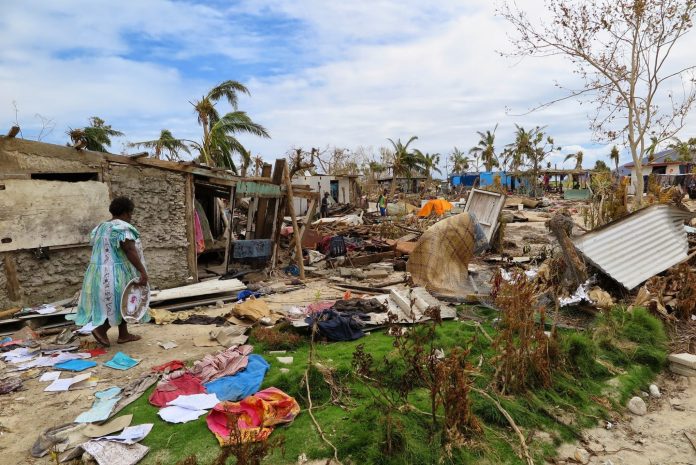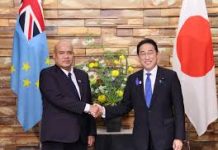In the wake of the latest warning from the Intergovernmental Panel on Climate Change, the Pacific island nation renews calls for a global phaseout of fossil fuels.
By Ralph Regenvanu
Vanuatu is on a permanent war footing due to the climate crisis. It is a country on edge. As I walk through the streets of our capital city, Port Vila, I see destruction wrought by back-to-back category 4 tropical cyclones that tore through within hours of each other in March. We are no stranger to storms, but this was the first time this country of 300,000 people, spread across 80 islands, had been hit twice over such a short period. As our president told Cop27: “Fundamental human rights are being undermined, every minute of every day, by our collective addiction to fossil fuels.”
That’s why the government is leading a coalition of over 115 countries pressing for the International Court of Justice to clarify countries’ legal duties with regards to climate change across international law. It’s why we stood beside Pacific, Africa, Caribbean and Asian colleagues at Cop27 to make the case for a strong and funded loss and damage mechanism to help vulnerable nations. And it’s why, as leading climate scientists at the Intergovernmental Panel on Climate Change (IPCC) issue their latest warning, we need to see an appropriate response from leaders in 2023.
I often read articles claiming that the target to keep global warming under 1.5C is impossible. People seem to forget that beyond that limit, countries like Vanuatu face irreparable damage. Cyclone Harold, which hit Vanuatu in 2020, caused damage equal to 60 per cent of the country’s GDP in a matter of hours, the government estimated. Many communities had still not fully recovered, and now have been hit again. As the IPCC’s latest report underlines, these levels of damage will only increase as the planet warms. So my response to those who say 1.5C is impossible is blunt: losing my country is not an option.
In 2023 we need to see countries recommit to the Paris Agreement on climate change mitigation and agree, finally, to phase out all fossil fuels. Our country was the first to call for a global treaty to phase out fossil fuels. Vanuatu has already committed to 100 per cent renewable energy by 2030. It will be hard but we are determined to lead, even if the bigger global economies are not. If we can commit to this, tell me why all G20 countries can’t do the same?
At Cop28 in Dubai this year deal should encourage all countries to re-submit better 2030 climate plans and ensure that 2035 goals from all countries bar the poorest are “economy wide” and in line with the 1.5C warming limit. The ratio of clean to dirty energy investments is currently 1.5 to 1: it needs to be 9 to 1 by 2030, according to analysis by researchers at Columbia University. Let’s agree to make this happen.
Critically, at Cop28 we need to see governments accelerate work on supporting front-line countries struggling to adapt to extreme weather. Billions were mobilised by wealthy nations through Covid to protect their economies. The cash is there: we need to appreciate that the climate crisis is as urgent as any war, and that funding flows must be raised in line with the promise of US$100bn a year of adaptation finance, which was made in 2010 and renewed in 2021 and 2022.
In 2023 I’d also like to see a new era of collaboration emerge at a time when the world’s big powers take their lead from smaller countries in the Pacific, Africa and the Caribbean and treat this crisis like the existential threat it is for us. 1.5C is not a target for us: it is our future. The technology is there, the skills are there; all we need is political will. And if leaders are wobbling, I invite them to Vanuatu to see this crisis face to face.
SOURCE: THE STATESMAN/PACNEWS


















